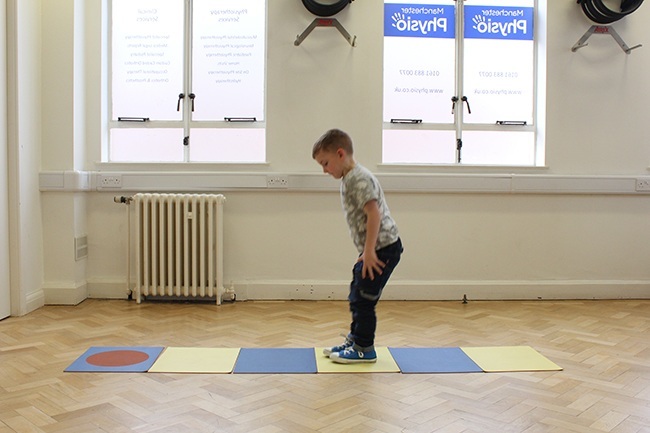
Dyspraxia Assessment
The Dyspraxia Assessment is an assessment tool used by occupational therapists to evaluate if the child has symptoms that relate to a condition called Dyspraxia and how dyspraxia is impacting upon your child's function in relation to activities completed both at school and at home.
Taking a holistic approach, the Dyspraxia assessment incorporates all aspects of childhood activities, from physical difficulties to social or behavioural issues that are currently having a detrimental effect on their ability to perform in school and at home.
Find out more...
- Where and how is the Dyspraxia assessment completed?
- What problems may be suitable for a Dyspraxia assessment?
- What will the Dyspraxia assessment assess?
- What information will I receive following a Dyspraxia assessment?
- Treatment
- Summary
Where and how is the Dyspraxia assessment completed?
The Dyspraxia assessment is an assessment that can take place at school, home or in clinic. It is completed by an occupational therapist mainly through observation of the kind of activities children partake in whilst at school and around the home. For example, running or physical activity, negotiating corridors without bumping into people, writing, doing up coats or buttons, concentrating, multitasking and remembering information are all activities children do during an average day. Through the use of the DASH assessment tool the therapist will guide you on the severity of dyspraxia and how it may be affecting your child.
Back to top
What problems may be suitable for a paediatric Occupational Therapy dyspraxia assessment?
You may notice your child experiencing some of the problems listed below, if so they are likely to need a paediatric Occupational Therapy dyspraxia assessment.
- Difficulties planning movements
- Bumping into objects/people frequently
- Clumsy
- Uncoordinated
- Unable to complete simple or complex movements (skipping, hoping jumping, running)
- Struggles to maintain balance
- Fidgeting/ unable to stay still
- Easily excited
- Avoidance of construction based toys
- Dominate hand not established
- Struggles to understand verbal instruction
- Concentration difficulties
- Struggles to multitask
- Struggles to remember more than a few pieces of information
- Poor handwriting
- Slow at getting dressed
What will the Dyspraxia assessment assess?
The Dyspraxia assessment will assess if your child has Dyspraxia and to gain a better insight into how Dyspraxia is affecting your child during day to day life, both at school and at home. This would include a detailed discussion and practical assessment of how the symptoms of Dyspraxia are impacting on function, and provide reasons why this could be.
Reasons why your child may need a dyspraxia assessment:
- Impact on the school environment
- Impact on the home
- Impact of dyspraxia on function
- Social or behavioural implications
The Dyspraxia assessment also considers how the condition is impacting upon the child within the school environment. This could be the effect dyspraxia is having on movement in Physical education lessons, or in joining in with other pupils at playtime. Dyspraxia also has an effect on concentration and working memory during class, this could possibly result in the teacher having to repeat instructions directly to your child, or your child becoming lost and unsure on the task when everyone else starts working.
Impact on the home
The Dyspraxia assessment will evaluate the effect the condition is having on home life. This could include aspects such as physical or behavioural impacts on the time taken to complete activities. For example, playing outside with siblings can be a challenge, often resulting in low confidence in their own abilities �I can�t do it� and a lack of motivation to join in, possibly leading to isolation. The occupational therapist would use the dyspraxia assessment tool to assess how these problems are influencing the dynamics and functional capabilities of the home.
Impact of Dyspraxia on function (Physical)
The Dyspraxia assessment would highlight the physical implications on daily function. For example, children with Dyspraxia have common difficulties in areas such as coordination and planning. The Dyspraxia assessment would be used to identify how these difficulties are affecting your child�s ability to complete important occupations (such as getting dressed and gross motor skills).
Social/Behavioural implications
Not only does the Dyspraxia assessment consider the implications of Dyspraxia on the home, school and its relation to physical function, it also considers how Dyspraxia affects the child�s behaviour. Suggesting possible explanations as to why the child is behaving as they are (at home, school, social events or with others)
Back to top
What information will I receive following an Dyspraxia assessment?
Following an assessment, the therapist will first explain the outcome of the assessment and what this means in relation to your child and their function at home. If required you can request to receive a Dyspraxia report based on the findings of this assessment. This will contain a detailed analysis of the impact the condition is having on your life, a treatment plan and recommendations that will improve your daily living.
Back to top
Treatment following a Dyspraxia assessment
Some of the possible Occupational Therapy interventions following a dyspraxia assessment are:
- Gross motor groups
- 1:1 therapy
- Improved motor planning
- Reduced clumsiness
- Education and advice to parents and schools
- Social integration
- Concentration games
- Memory games
- Environmental adaptations/reduction of distractions
The occupational therapist would assess and determine the most suitable intervention that is most likely to address your child�s individual needs.
Summary
In summary the Dyspraxia assessment is an assessment tool used by occupational therapists to evaluate how dyspraxia is impacting upon your child�s function, which can take place at school, home or in clinic. It is required if your child has difficulty planning movements, is clumsy or uncoordinated or struggles to remain concentrated. Following a dyspraxia assessment, the occupational therapist can offer selected treatments aimed at improving function.
If you would like a DASH assessment or want to talk about any of the problems above then please email office@otforkids.co.uk or call 0330 223 0888
 ↑ Back to Top
↑ Back to Top
 Next steps:
Next steps:Please contact one of our experienced occupational therapists today and we will gladly discuss how we can help and what services we can offer you.
- 0330 223 0888
- office@otforkids.co.uk
- 2 Hagley Rd, Salford M5 3EY [map]







 OT for Kids have been a great help in aiding my son Jake with coping with his dyspraxia both at home and in school. They came out to our house and completed the assessment at home.
OT for Kids have been a great help in aiding my son Jake with coping with his dyspraxia both at home and in school. They came out to our house and completed the assessment at home.






